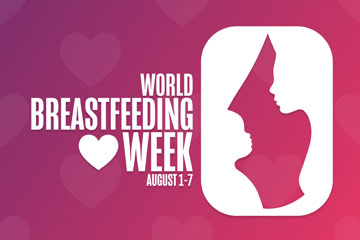Do you know that one of the most effective ways to ensure child health and survival is through breastfeeding? Breastfeeding provides every child with the best possible start in life. This practice significantly improves the health, survival and well being of infants, children and their mothers – both in the short- and long-term. World Breastfeeding Week (WBW) is observed every year from August 1-7 to raise awareness about the importance of breastfeeding. This year’s theme for WBW is “Protect Breastfeeding: A Shared Responsibility”.
WABA and WBW
A global campaign to protect, promote and support breastfeeding, WBW is celebrated in commemoration of the 1990 Innocenti Declaration. This campaign is coordinated by the World Alliance for Breastfeeding Action (WABA) which is a global network of individuals and organizations dedicated to the protection, promotion and support of breastfeeding worldwide. The aim of the campaign to inform, engage and galvanise action on breastfeeding and related issues.
Established in 1992, this global campaign in support of breastfeeding was observed with annual themes including healthcare systems, women and work, the International Code of Marketing of Breastmilk Substitutes, community support, ecology, economy, science, education and human rights (waba.org.my). Since 2016, WABA aligned their WBW campaign to the United Nation’s Sustainable Development Goals (SDGs) and is known as WBW-SDGs Campaign.
Why Protect Breastfeeding?
The American Academy of Pediatrics (AAP) and the American College of Obstetricians and Gynecologists recommend:
- Breastfeeding exclusively (without formula, juice, or water) for 6 months is a must
- Breastfeeding for a year at least with other foods (such as vegetables, grains, fruits, proteins) be started at 6 months of age.
For both children and mothers, breastfeeding delivers health, nutritional and emotional benefits. Breast milk is a nutritionally balanced meal that provides essential nutrients as well as antibodies to protect newborns against infectious disease. Researchers have also found that breastfeeding may have physical and emotional benefits for both mother and baby.
Breastfeeding offers many benefits for infants and their mothers:
For Babies
- Provides the ideal nutrition
- Helps build a stronger immune system
- May reduce disease risk with less incidence of diarrhea, constipation, gastroenteritis, gastroesophageal reflux, and preterm necrotizing enterocolitis (NEC), colds and respiratory illnesses and so on
- Better vision and less retinopathy of prematurity
- Promotes baby’s healthy weight
- Lower rates of infant mortality and Sudden Infant Death Syndrome (SIDS)
For Mothers
- May help mothers lose weight
- Helps the uterus contract
- Parents have up to 6 times less absenteeism from work
- Lowers risk for depression
Breastfeeding is one of the best investments for saving lives. It improves the social and economic development of individuals and nations. That’s why we need a public health approach to breastfeeding to build back better systems in normal and crisis situations. As it is a shared responsibility to protect, promote and support breastfeeding to achieve sustainable development, all parents with young children should have access to skilled breastfeeding counselling and support from health facilities, workplaces and communities.
Support this global campaign – spread the message about the importance of protecting breastfeeding.
